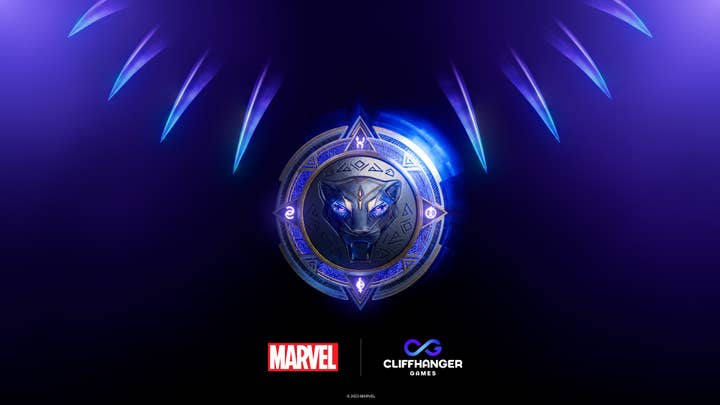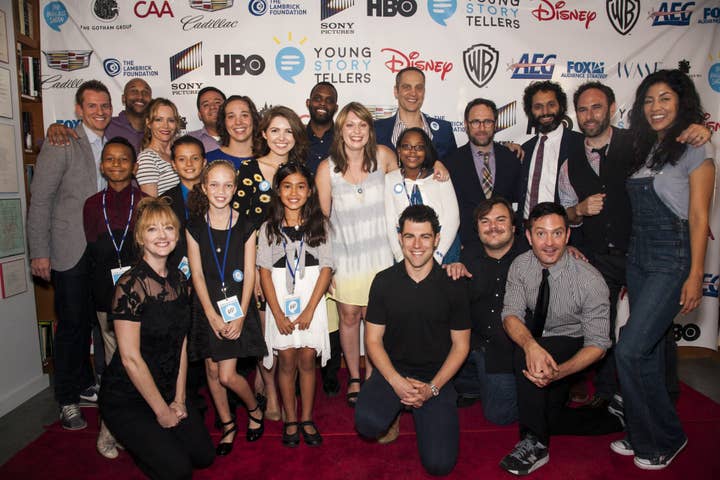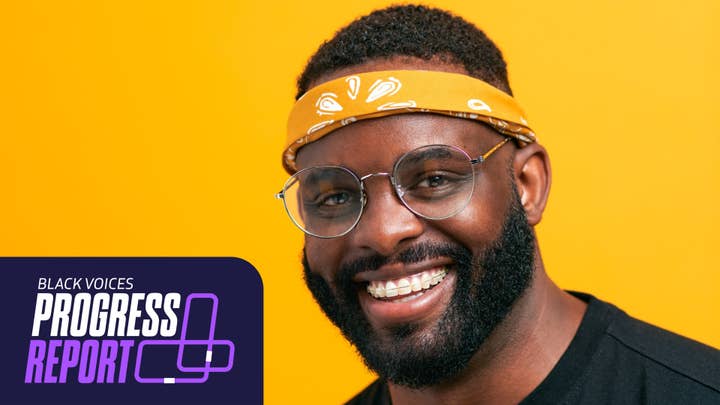From Kingdom Hearts fan movies to writing EA's Black Panther | Black Voices Progress Report
Curtis Baxter on his path to Cliffhanger Games, and the value of mentorships, internships, and genuine networks
This interview is part of GamesIndustry.biz’s Black Voices Progress Report, offering insight into the different experiences Black professionals have in the games sector. You can read more about the project and check the other entries on this page.
The project and the studio were unveiled in July last year: EA launched Cliffhanger Games, a new developer working on a Black Panther game.
And while making it clear that he is speaking to us as an individual and not on behalf of EA or Cliffhanger Games, senior writer on the project Curtis Baxter is keen to speak of the context of this title when asked about what it's like being a Black games professional in 2024.
"It is a game that is really important to me," he says. "I think there's a big responsibility from myself and then also the broader studio to really deliver something that's both unique, but then also speaks to the culture.
"And I'm hoping that it inspires people who want to get in games after seeing it, because I remember the day I saw the Black Panther movie, the very first one, and how I felt like a little kid again, I felt like this was made for me, and I was in the theatre crying at the credits. I'm like, 'Oh my goodness, this is how white people feel 24/7!' I saw the movie three or four times in theatres because I really, really felt seen and it inspired me. But I didn't think eight years ago I'd be helping write the game now."
Baxter's passion for games started in childhood and doubled down when he moved to Japan at nine and "fell in love with everything nerdy," he smiles.
After he came back to the US, he studied at UCLA but wasn't sure on the path ahead, only that he wanted to "do something creative." He explored acting for a while before finding what makes him click.
"I took an undergrad writing course during my very last quarter at UCLA and I fell in love with it. I really hounded my [teaching assistant] – probably to the point where he was very annoyed with me," Baxter laughs. "That was definitely like a 'choose me, pick me, I really want to be good at writing' moment, but I'm glad I did. He had a lot of patience with me, and he really helped me become the writer I think I am today to be honest. So from then on, I was like: 'I want to do this as a career'."
Baxter took a year off between undergrad and grad school, and wrote no less than four movies based on one of his favourite franchises, Kingdom Hearts, as well as a wealth of original material, and applied to UCLA again to go for a masters in screenwriting.
"I heard the writing program was great and I got in. I think that really helped me sharpen my tools as a writer. They didn't have a video game writing course at the time, it was just film and television, so I sharpened my skills that way."
He says that he was "the only Black guy in the entire programme," noting: "It's interesting when you're writing a lot about the Black experience and you have multiple folks who don't necessarily understand that experience giving feedback on all of your scripts…"
He then found a job on Pretty Little Liars, a mobile game that Warner Bros. had licensed to San Francisco-based mobile developer Pocket Gems.
"That was in about 2014, and then I just kept writing from then on. Fast forward to where I'm at now; the pandemic hit back in 2020, and I found myself in the Bay and I was actually without a job and I didn't know what to do – I was going through a lot.
"EA eventually reached out to say, 'Hey, you know, we're doing this game and we'd love for you to be part of it,' because they saw my previous work. I thought it was gonna be this one-off thing and I was like, 'This is gonna be fun!'... And that game turned out to be Black Panther. So I was actually a contractor for the first three months, and then they wanted to hire me full-time. So I've been writing there [since 2021]."

That's not to say it's been smooth sailing all along. After UCLA and his start writing interactive narrative games at Pocket Gems, Baxter says he did hit a few "hiccups along the road" before he seized the opportunity at EA.
"I was a narrative designer for a company up in the Bay Area, and I was ousted from that company and wrongfully fired. Mind you, I was the only Black male at that company and it was partly because my manager blew up on me.
"There's a big responsibility from myself and then also the broader studio to really deliver something that's both unique, but then also speaks to the culture"
"It was the wildest thing I ever experienced, and probably the worst thing I've ever experienced in my entire career where she berated me in front of the entire office and I didn't say anything back because obviously I didn't want to get in trouble myself... Their reason why they fired me was all racially motivated stuff. 'No one felt comfortable or safe working with Curtis'. But mind you, I was friends with everybody on the team. But they needed to say something to get me out.
"At that point I really realised that once you're working your way up, in any industry probably, but in the games industry as well, you're gonna be met with those kinds of things, especially when [you're] what we like to call in the Black community the 'lonely only' – when you're the 'only' in any situation, it's not a good place to be.
"I try to do my best now when I do join teams, looking at who I'm going to work with, I try to make sure that I'm not the 'lonely only' because I don't want to be put in that position ever again."
He acknowledges that there's still a lot of work to do even now that he's an established voice in games, adding: "There's not a lot of people that look like me, and I'm trying to be part of that change as well."
He continues: "And that's the reason I also joined [EA's Black Panther team] because it's a property I feel super passionate about, especially on the heels of a previous job where it was all racially motivated. Ahmaud Arbery and George Floyd and all this stuff and the Black Lives Matter Movement, it was all happening while I was experiencing this so that was probably the roughest point. But I think I emerged a lot stronger. I started going to therapy in 2020, I haven't stopped and it's been great."
Having also worked across TV and film, most notably at Cartoon Network, Baxter sees similarities between these fields and the games industry, especially in the way career progression works, in particular for marginalised groups.
"I love the people who work in games because they're super passionate about the products. I will say that there is a facade that is super welcoming, which I also find similar to Hollywood.
"People tend to hire people who look like them or their friends. Another part of that I do believe especially for minorities, for women, [is] there are not that many people in power making decisions, green lighting stuff. And also hiring – if we don't have women, we don't have people of colour, minorities, in those positions of power, then there's a good chance those kinds of people are probably not going to get hired at the same rate as their counterparts.
"I do think there are organisations and people who are actively working to change that. There's DevColor, Black Girls Code, the Black in Gaming Foundation – there's a bunch of different organisations out there. But I do think there's a lot of work to be done."
Baxter says training is crucial to stopping the games industry's vicious cycle of marginalised groups not applying for jobs because they don't see themselves represented in senior positions.
The cycle was recently pointed out on social media by The Verge reporter Ash Parrish, based on stats from the 2023 GDC survey. Looking at career longevity, 87% of game developers with over 21 years of career were white men. Only 6% of Black men working in games reported having over 20 years of experience, and there were no Black women at all.
"There's not a lot of people that look like me, and I'm trying to be part of that change as well"
"I think [one solution is] training people at senior levels or even at junior and associate levels and making sure that you sit down with them and say, 'Look, what's the path to being a leader on the team or being a leader in another organisation?' Really start that from the get go. I think it does two things. One, it prepares them for those potential roles, but two, it also motivates them and gives them a North Star to get to."
Looking ahead, Curtis says he reflects on his successes and failures every week and on a monthly and yearly basis as well, looking at and tracking his goals, thinking about his personal development and his career, as well as his relationships.
"In terms of career, that's actually something I'm really dealing with now [which] is where do I see myself in the future outside of just the writer role, right? I do have aspirations to be more in the games industry and I would love to be head of story or be a director or narrative director because story is my bread and butter.
"I think in terms of things that might be preventing me from getting there, it just seems like there's so much consolidation in the gaming industry, there are so many layoffs, and guys who are in those positions right now are typically the ones that stay in those positions. And it's like, how do you navigate and get in if those roles [that] are often few and far between? And also when they are available they're already taken by my white male counterparts."
When asked whether he feels that needle is moving in terms of diversifying the industry and specifically for Black games professionals, Baxter answers: "Barely, and that's being generous in my opinion."
"Every company imaginable is getting rid of their DEI programs. In the past few months, there's been this weird flip of like, we don't think DEI is right, it's 'reverse racism', which I think is comical.
"And it's sad because all of these companies, going back to 2020 and the Black Lives Matter movement – and obviously this is in America, but I think it does hold ground worldwide, especially in the UK which has a huge Black population as well – they were like, 'Oh, we're going to invest in DEI, get more people on staff, train them, make sure that we support them'. But we're in 2024 and most of those programmes either never got off the ground or are all ending. So there's a lot of lip service. And I don't think that's good for anybody in my position, especially minority folks in the gaming industry."

When asked about what experiences he thinks offered him a better chance as a Black games professional to get where he is now, Baxter goes back to his uni experience and really enthuses about UCLA's writing programme.
"UCLA was fantastic, just being around the calibre of writers I was around. And also that network is invaluable. Linking back to organisations, one of these other organisations I [joined] while I was in grad school is called Young Storytellers. And one of the things that they do is they uplift marginalised voices.
"Usually they work with elementary school students, and work with kids who maybe have a predisposition to the arts, maybe they're bullied in school, maybe they have a disability – we help them write their own story and get actors to help act it out. I love that non-profit. I think helping people and doing things for others has helped with my own career in terms of going back to the reasons why I wanted to be a storyteller."
"Building genuine relationships will serve your career well, and if you are going to network, network with other people at your level"
To young Black game professionals just entering the industry or just wanting to get into games – and specifically writing games – Baxter says it's all about learning how to write in someone else's voice.
"[This] is gonna serve you well in your career. Because most of the time, especially now, everything is IP driven, and if the IP exists prior to [you joining], then you're gonna be pulling a lot from IP. Obviously, I'm doing Black Panther [but] almost all of my writing roles up to now have been based on some other pre-existing IP. So from a writer's perspective, I would definitely say always, always, always learn how to write in a voice.
"Just speaking generally, internships are fantastic and they are just a great way to first off learn about the industry. Speaking from a film and TV background, during grad school I also did three different internships. The first was at Fox, the second was at Disney, and then also Sony. At Disney, I was trying to get Kingdom Hearts made," he smiles.
"But you just learn so much from people and develop those real relationships. One really big thing I want to say about networking that served me so well, is that I try not to go to networking events often, and the reason is I feel like it can be a little bit transactional. I think when you do internships and you put yourself in places where you want to be, and where those kinds of people are, find one person, maybe two people that you really want to genuinely get to know.
"Building genuine relationships will serve your career well, and if you are going to network, network with other people at your level. Whatever you're doing, if you're an engineer or if you're a writer, make something, go create something, put it out there, it doesn't have to be perfect.
"Put it out there and start getting those skills, because I do think what you'll learn as you create something, then those skills will transfer over when you are ready for your first associate or entry-level position somewhere."
He continues: "That's another good thing, too – mentorship. Like my [teaching assistant] from grad school, Tony! There are tons of people that helped me along my journey. So if you can get a mentorship and reach back and also pay it forward and mentor others, that's huge."
Sign up for the GI Daily here to get the biggest news straight to your inbox









